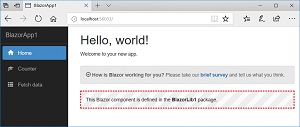News
Blazor Update Adds Reusable Component Libraries
Microsoft has updated Blazor -- for full-stack Web apps coded in C# -- with new features including the ability to create reusable component libraries.
Blazor leverages the new WebAssembly project that converts higher-level language code to assembly-like code for performance better than JavaScript. WebAssembly also works with programming languages such as C, C++ and Rust. While Blazor/WebAssembly has been described as the "death" of JavaScript by some developers, Microsoft denies such a characterization, saying it's rather just another tool to be used, even in conjunction with JavaScript.
In fact, the Blazor 0.2.0 update announced this week allows for JavaScript interop as part of the new ability to create reusable component libraries.
 [Click on image for larger view.] A Blazor Component (source: Microsoft).
[Click on image for larger view.] A Blazor Component (source: Microsoft).
"Blazor apps can call browser APIs or JavaScript libraries through JavaScript interop," Microsoft's Daniel Roth announced in a post. "Library authors can create .NET wrappers for browser APIs or JavaScript libraries and share them as reusable class libraries."
Those reusable libraries can provide Web UI components to be used in different projects while maintaining state and handling events. Developers can create the components, package and share them with others.
Other new features in the update include:
- Improved syntax for event handling and data binding
- Build on save in Visual Studio
- Conditional attributes
- HttpClient improvements
Roth thanked community volunteers for helping out with the improvements, noting that Blazor has already been put to use in developing real-world Web apps.
Meanwhile, WebAssembly itself is forging ahead, with v 1.0 shipping in four major browser engines. Mozilla, a primary backer of the project, recently offered up a Web-based IDE to code WebAssembly, though at this stage it's primarily a learning/fiddle (testing) type of project. With further refinement, its features could be provided to Visual Studio Code and other code editors/IDEs via extensions.
About the Author
David Ramel is an editor and writer at Converge 360.